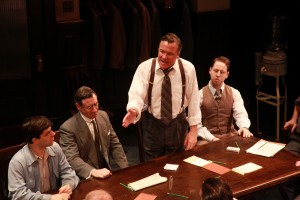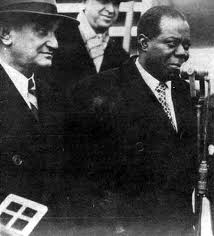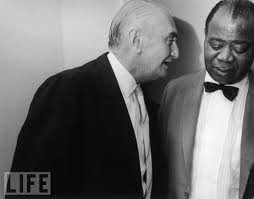“I haven’t a particle of confidence in a man who has no redeeming petty vices whatsoever.”
Mark Twain, “Answers to Correspondents”
Archives for 2011
TT: Twelve superior actors
In today’s Wall Street Journal drama column I sing the praises of a show in Sarasota, Florida, Asolo Rep’s revival of Twelve Angry Men. Here’s an excerpt.
* * *
Great character actors make the world of theater go round. Florida’s Asolo Repertory Theatre is proving the point with its exceptional revival of “Twelve Angry Men.” Reginald Rose’s popular jury-room drama is better known as a movie than a play–it was originally written for a CBS telecast in 1954, then filmed in 1957, and only made it to Broadway a half-century later–and the film version starred Henry Fonda and Lee J. Cobb, two of Hollywood’s best-known faces. In most of its incarnations, though, “Twelve Angry Men” has served as a vehicle for unfamous performers who look and sound (as Jack Webb said of the character actors whom he cast in “Dragnet”) “as real as a guy pouring a cup of coffee.” That’s what Asolo Rep is giving us, and the results are truly inspiring.
 Mr. Rose’s 1964 stage version of his original “Studio One” teleplay is an astonishingly well-made piece of work. The mechanism that propels the stage action, which is played out in real time, couldn’t be simpler–one juror gradually persuades his 11 colleagues not to send a slum kid to the electric chair–but often the simplest devices are the best ones…
Mr. Rose’s 1964 stage version of his original “Studio One” teleplay is an astonishingly well-made piece of work. The mechanism that propels the stage action, which is played out in real time, couldn’t be simpler–one juror gradually persuades his 11 colleagues not to send a slum kid to the electric chair–but often the simplest devices are the best ones…
The script also contains more than its share of high-minded heavy-handedness, however, and there are more than a few moments when you can all but see “APPLAUD” and “BOO” signs flashing over the proscenium. Not only is the never-seen slum kid who’s been accused of killing his father a member of an (unspecified) minority group who Never Had a Chance, but Juror No. 10 (played here by Douglas Jones) is an eye-rollingly self-evident bigot who telegraphs his bad-guy status right at the top of the play by making a clanking reference to “those people.” As for Juror No. 8 (Jud Williford), the lone holdout, he’s so damn noble that Fonda actually wore a white suit when he played the part in Sidney Lumet’s film.
But since I last saw “Twelve Angry Men” in the Roundabout Theatre Company’s excellent 2004 Broadway premiere, I’ve had two eye-opening experiences: I saw a kinescope of the original live-TV version, which was performed much more straightforwardly than Lumet’s film, and I served as the foreman for a New York jury. No, I didn’t wear a white suit, nor was I especially noble, but I did get to see how seriously my fellow jurors took what we were doing, and I realized in the process was that “Twelve Angry Men” is for the most part surprisingly true to life in its portrayal of what happens in a jury room. So is Asolo Rep’s production, which has been staged with bracing clarity by Frank Galati, a member of Chicago’s Steppenwolf Theatre Company ensemble….
* * *
Read the whole thing here.
TT: Afraid of the dark
The you-can’t-say-that brigade has been out in force lately, and I take on the forces of silence in today’s Wall Street Journal “Sightings” column. Here’s an excerpt.
* * *
In an age of political correctness run amok, defenders of free speech can never let their guard down. The past couple of weeks, however, have seen a string of particularly egregious incidents:
• In Alabama, Alan Gribben, a professor of English at Montgomery’s Auburn University, has edited a sanitized version of Mark Twain’s “Adventures of Huckleberry Finn,” the greatest of all American novels, in which the word “nigger” is replaced with “slave.”
• In Canada, “Money for Nothing,” a song by Dire Straits that was a hit single in 1985, has now been banned from the airwaves by the Canadian Broadcast Standards Council (CBSC) because Mark Knopfler’s lyrics make ironic use of the word “faggot,” putting it in the mouth of an envious working-class lout who uses it to refer to a rock star “with the earring and the make-up.”
• In Connecticut, David Snead, Waterbury’s superintendent of schools, is trying to stop that city’s Arts Magnet School from putting on a student production of August Wilson’s “Joe Turner’s Come and Gone” because the characters, all but one of whom are black, make repeated use of the word “nigger.”
Since these three incidents were the work of cultural bureaucrats who not only believe in mincing words but want to force you to mince yours as well, I’ll put it as bluntly as possible: Messrs. Snead and Gribben and the members of the CBSC are pusillanimous boobs who deserve to be fired. And while one expects such monstrosities these days, what happened in Waterbury is specifically deserving of your attention, embodying as it does a moral cowardice unworthy of anyone who claims to be a teacher….
* * *
Read the whole thing here.
TT: Almanac
“If there’s one word that sums up everything that’s gone wrong since the war, it’s Workshop. After Youth, that is.”
Kingsley Amis, Jake’s Thing
TT: So you want to see a show?
Here’s my list of recommended Broadway, off-Broadway, and out-of-town shows, updated weekly. In all cases, I gave these shows favorable reviews (if sometimes qualifiedly so) in The Wall Street Journal when they opened. For more information, click on the title.
Warning: Broadway shows marked with an asterisk were sold out, or nearly so, last week.
BROADWAY:
• La Cage aux Folles (musical, PG-13, adult subject matter, reviewed here)
• Driving Miss Daisy * (drama, G, possible for smart children, closes Apr. 9, reviewed here)
• The Importance of Being Earnest (high comedy, G, just possible for very smart children, closes Mar. 6, reviewed here)
• Lombardi (drama, G/PG-13, a modest amount of adult subject matter, reviewed here)
• Million Dollar Quartet (jukebox musical, G, reviewed here)
OFF BROADWAY:
• Angels in America (drama, PG-13/R, adult subject matter, closes Mar. 27, reviewed here)
• Avenue Q (musical, R, adult subject matter and one show-stopping scene of puppet-on-puppet sex, reviewed here)
• The Fantasticks (musical, G, suitable for children capable of enjoying a love story, reviewed here)
• Play Dead (theatrical spook show, PG-13, utterly unsuitable for easily frightened children or adults, reviewed here)
CLOSING SOON IN CHICAGO:
• Who’s Afraid of Virginia Woolf? (drama, PG-13/R, adult subject matter, closes Feb. 13, transfers to Washington, D.C., Feb. 25, reviewed here)
CLOSING SUNDAY IN FORT MYERS, FLA.:
• Sylvia (comedy, PG-13, some adult subject matter, reviewed here)
TT: Just because
Courtesy of Isaac Butler, one of the most unintentionally funny commercials ever filmed:
TT: Almanac
“It was no wonder that people were so horrible when they started life as children.”
Kingsley Amis, One Fat Englishman
TT: It’s real
 For the most part I’ve only talked about it in passing on this blog, but a year ago I started writing a one-man play about Louis Armstrong and Joe Glaser, his longtime manager. (The same actor plays both parts.) The play, which grew out of the research I did for my recent biography of Armstrong, is called Satchmo at the Waldorf, and a couple of weeks from now it will become more than just a furtive gleam in the author’s eye.
For the most part I’ve only talked about it in passing on this blog, but a year ago I started writing a one-man play about Louis Armstrong and Joe Glaser, his longtime manager. (The same actor plays both parts.) The play, which grew out of the research I did for my recent biography of Armstrong, is called Satchmo at the Waldorf, and a couple of weeks from now it will become more than just a furtive gleam in the author’s eye.
As part of my current residency at Rollins College’s Winter Park Institute, where I wrote the first draft of Satchmo at the Waldorf last year, I’m going to be taking part in a public presentation of the play’s opening section, the first time that any part of the script has been performed, either in public or in private. I’m staging the scenes that we’re doing–it’ll be my directing debut–and Dennis Neal, a seasoned actor who lives in Orlando, not far from Winter Park, will be playing the double role of Armstrong and Glaser. He’s mainly a stage actor, but the chances are good that you’ve seen him on screen, since his list of credits includes Tim Robbins’ Dead Man Walking and John Sayles’ Sunshine State.
I met Dennis yesterday afternoon at our first rehearsal, and within minutes I was floored. Not only is he quick and brilliantly responsive, but he instinctively sensed what I was looking for, gave it to me, then made it better than I could ever have imagined myself. It’s not my place to talk about the quality of the play, much less my staging of it, but I can absolutely guarantee you that Dennis is going to be a knockout and a wow.
 The play itself is probably not what you’d expect. Most one-man shows about famous people are unchallenging, sweet-tempered exercises in hagiography. Not Satchmo at the Waldorf. I’ve tried to show Armstrong as he really was and make him speak the way he really spoke–this is absolutely not a show for kids, unless you’re the kind of parent who’d take your kids to see American Buffalo–and I’ve also tried to suggest the knotty complexity of his quasi-filial relationship with Glaser, an ex-gangster from Chicago who ran his career with an iron hand. To put it another way, I wanted to write a real play, not a piece of fawning fluff, and now that I’ve seen some of it in the rehearsal studio, I feel pretty good about the results.
The play itself is probably not what you’d expect. Most one-man shows about famous people are unchallenging, sweet-tempered exercises in hagiography. Not Satchmo at the Waldorf. I’ve tried to show Armstrong as he really was and make him speak the way he really spoke–this is absolutely not a show for kids, unless you’re the kind of parent who’d take your kids to see American Buffalo–and I’ve also tried to suggest the knotty complexity of his quasi-filial relationship with Glaser, an ex-gangster from Chicago who ran his career with an iron hand. To put it another way, I wanted to write a real play, not a piece of fawning fluff, and now that I’ve seen some of it in the rehearsal studio, I feel pretty good about the results.
I’m also enjoying my first shot at directing. Dennis says that I’m giving him what he needs in the way of guidance, and he doesn’t strike me as the kind of guy who’d say a thing like that just to be polite. Be that as it may, directing a play seems to feel natural to me, at least so far, and I can’t wait for the two of us to roll up our sleeves and really get down to work next week.
And after February 1…what? That remains to be seen. For the moment I can’t say any more than that I’ve acquired a theatrical agent and that a number of people in the business have expressed interest in the script. But now that Dennis has showed me what Satchmo at the Waldorf looks and sounds like, I’m starting to feel as though something good may come of my maiden voyage into the deep waters of playwriting.
* * *
For more information about the first performance of scenes from Satchmo at the Waldorf, go here.
